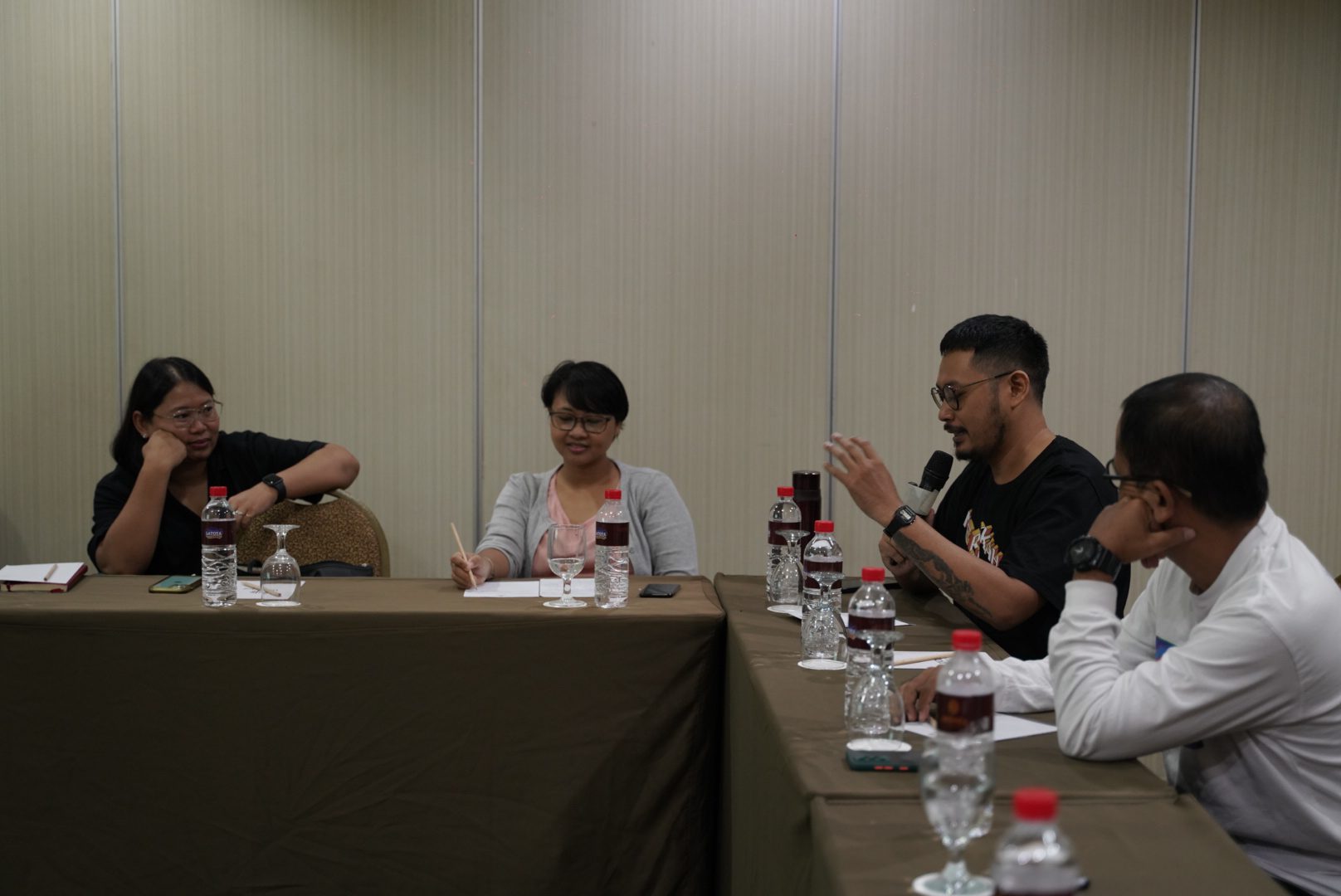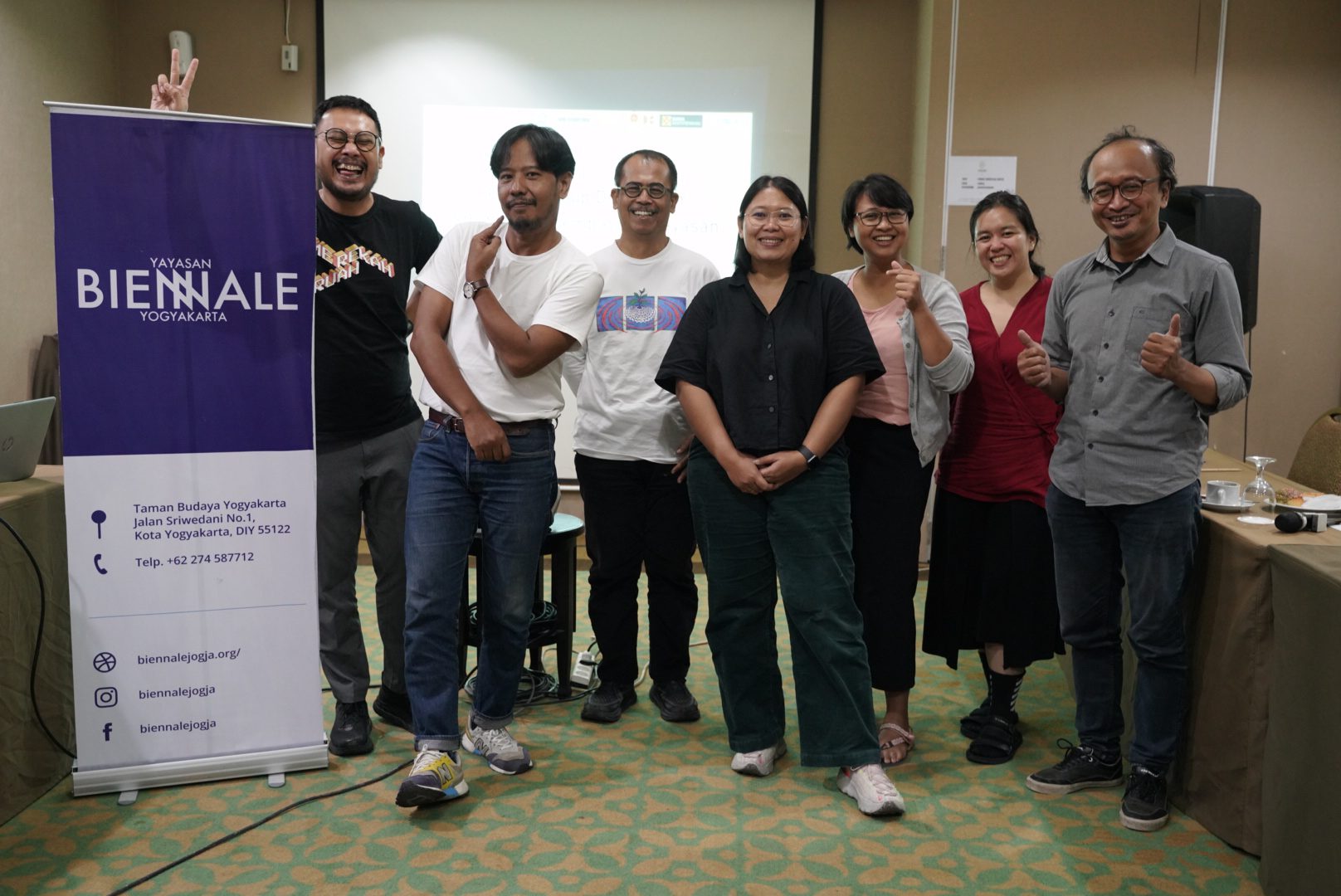Biennale Jogja has finished with Equator Round I and started Round II of the exhibition in 2023. After a decade of Biennale Jogja’s efforts to bring decolonization as a foothold in art, it is also necessary to reflect on how the Biennale is positioned in the arts ecosystem today in its context as an organization. On Tuesday (19/03) and Saturday (30/03), the Yogyakarta Biennale Foundation held a discussion forum with Board members and representatives of academics in the field of art and other art organizations in Yogyakarta. The discussion guests included: Wimo Ambala Bayang (MES56 Room), Dito Yuwono (Cemeti Art House), Mira (Cemeti Art House), Sita Sari (IVAA), Pius Sigit (Art activist), Yustina Neni (Co-founder of YBY), Nasir Tamara (Member of YBY Board of Trustees), Noor Arief (Member of YBY Board of Trustees), Dr. Rr. Paramitha Dyah Fitriasari, S.Ant., M.Hum. (Head of Performing and Fine Arts Studies Program UGM), Nano Warsono (Lecturer at Faculty of Fine Arts ISI Yogyakarta), and Alia Swastika (Director of YBY).
The discussion was opened by Alia Swastika by explaining the purpose and main topics of the forum discussion. The purpose of this FGD is to enable the Yogyakarta Biennale Foundation to hear about the current situation of the arts directly from those who are struggling in the same ecosystem. Then, thinking together what steps YBY can take to respond to today’s situation, especially in Yogyakarta. The opening topic was a description of the vision and mission that the foundation has been working towards. The second topic discussed the challenges faced. The third topic was the resolutive and preventive steps that can be taken.
In explaining YBY’s vision and mission, Alia Swastika said that YBY continues to strive for new ideas to break out of the shell of eurocentrism in the art world. These efforts are nurtured through an alternative education process that embraces young artists, writers and researchers to train together. Then, it publishes writings in the form of books and symposiums to rewrite the new history of Indonesian art. In order to break power relations, YBY also seeks to build a network of academics, thinkers and theorists from the global south and invite them to the Equator Symposium program.
The composition of FGD participants consisting of various generations made the discussion richer. In response to the issues above, Dito Yuwono spoke about the importance of involving the younger generation in forums like this. Sita Sari also had a similar view that it is important to pay attention to the younger generation currently working for arts organizations, whether they feel a certain burden and how to guide them.
The discussion on that day only mapped out the problems that YBY is facing and is likely to face in the future. So, the discussion was continued on Saturday, March 30, 2024. The invited audience included Robertus In Nugroho (academic and socio-cultural researcher), Sita Sari (Director of IVAA), Gintani N.A. Swastika (Ace House Collective), Doni Maulistya (Padepokan Seni Bagong Kussudiardja), Wimo Ambala Bayang (MES56 Room).
The discussion evolved to talk about the distinction of Biennale Jogja. Robertus In Nugroho emphasized the need to underline the ecosystem. According to him, among the public, the art ecosystem, and the landscape of Jogja, the Biennale offers what kind of distinction? In short, what makes people feel that there is something missing if there is no Biennale in the art ecosystem.
The discussion did not only revolve around relationships with the external or public. However, many also discussed managerial issues. Sita Sari discussed the importance of mapping the groups that manage resources (both financial and human) and how they are managed.

Discussing management, Doni Maulistya raised a point about systems. Is the good governance system like a company or organic. Sita Sari responded that it is difficult to directly apply good governance to the social context of Yogya society which has strong collectivism and organic relations. So, you can’t really separate and choose one of the two systems above. But, there needs to be a portion. For example, when managing finances, a good governance system is needed.
In the end, the discussion found several conclusions, namely the need for YBY to map the characteristics of Yogyakarta art, the foundation’s position in the art ecosystem, and determine the organizational culture.



